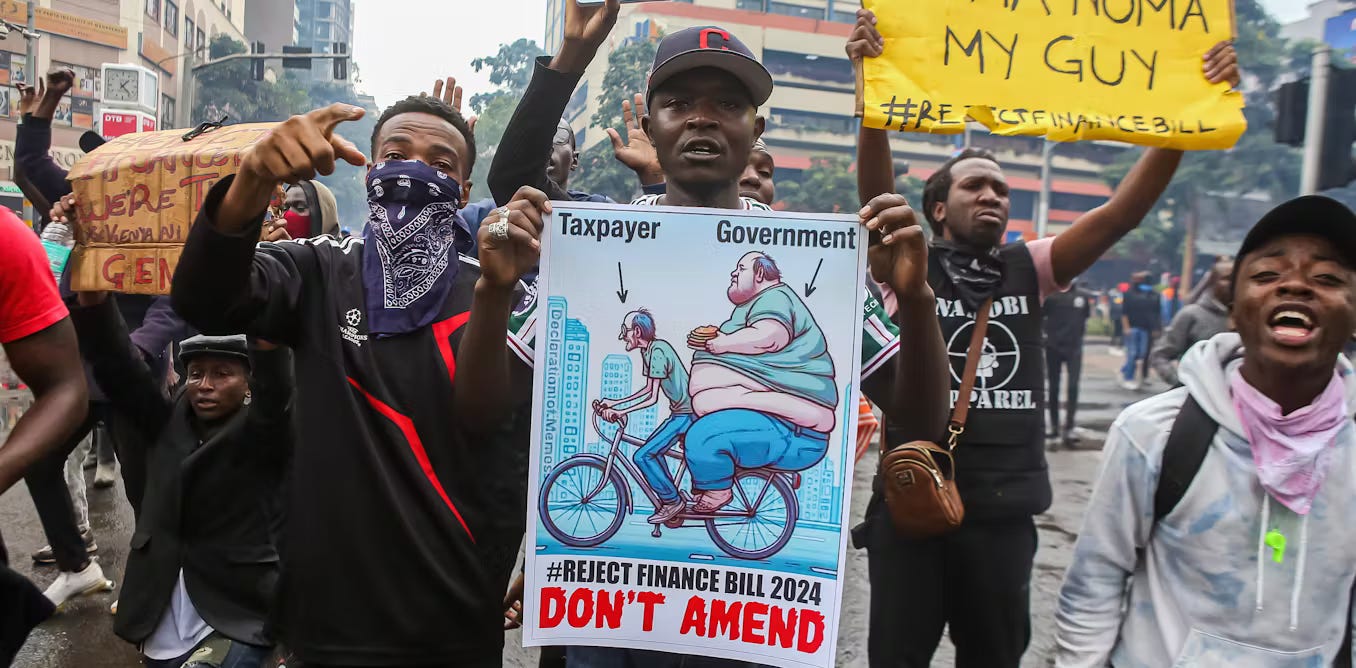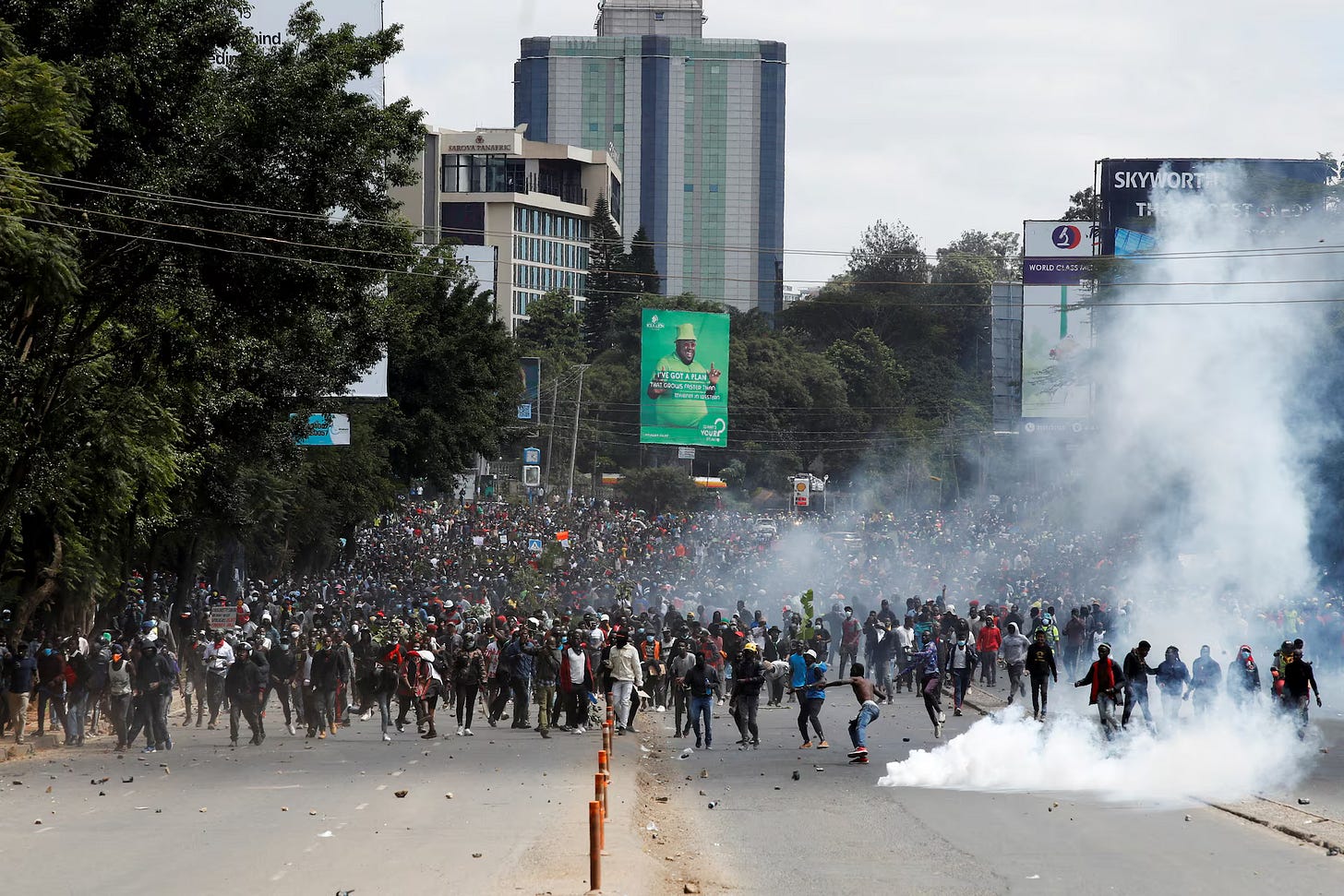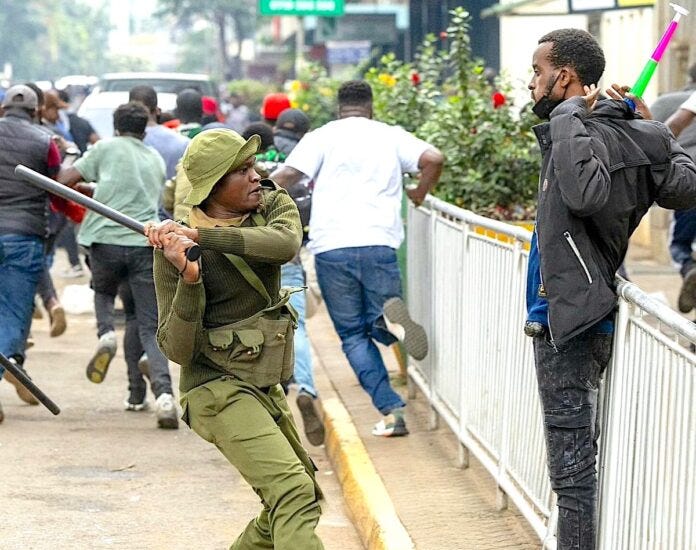
After a week of contestation and the loss of thirty-nine lives, they won the first battle. Kenyan President William Ruto yielded to the youth-led protest movement on Wednesday 26 June, a day after the bloody repression, and announced he would not sign the controversial Finance Bill 2024 into law.
But this was only the beginning. The protests against the Finance Bill have grown into a nationwide movement against corruption, mismanagement of the country and police brutality.
“Our lives are tough. People are struggling, people don’t have enough to eat, families can’t put food on their tables. We need change in this country, and this finance bill isn’t gonna bring that change,” said one protester in Mombasa, Kenya’s second largest city, during the anti-bill protests.
The current protests have deeper roots than taxes: young people are looking for answers, and the Finance Bill was the catalyst. In Kenya, 67% of young people are unemployed, according to the Deutsche Welle.
“We want the government to be accountable, for the things they are telling us, for these promises that they are making and that they are breaking. Because they are breaking families and people are struggling,” the Mombasan protester added.
Kenyans are struggling with an exploding cost of living linked to the multiple crises hitting the country: the devaluation of the Kenyan shilling, the aftermath of Covid-19, an exceptional drought in the Horn of Africa that has been going on since 2020, the grain crisis due to Russia’s invasion of Ukraine, and a government that went on a shopping spree and is now trying to find cash.

Bread, the engine of revolution
Initiated online by young, tech-savvy Kenyans, the protests began on 18 June and culminated in a general strike on 25 June, coinciding with the parliamentary vote on the Finance Bill in Nairobi. They rallied behind #RejectFinanceBill2024, a pretty self-explanatory hashtag.
The annual bill was first proposed in May. It originally included a 16% sales tax on bread and a 25% tax on cooking oil, as well as a proposed increase in the tax on financial transactions and a new tax on vehicle owners amounting to 2.5% of the vehicle’s value per year.
This was amended after a public outcry.
The government then proposed the Eco Levy, a tax targetting electronic wastes and manufactured products contributing to environment harm. It backfired as the law would also increased price of essential items (sanitary towels, diapers, mobile phones...) and electronics as a whole, some rightly arguing it will harm Kenya’s economy. The text was eventually forced to change again.
The latest and final provisions of the Finance Bill included a 16% VAT on bread and imported table eggs, onions and potatoes, a 15% to 40% VAT on financial services and foreign exchange transactions, an increase from 15% to 20% in the excise tax on mobile money transfer charges... the full list is here.
William Ruto’s government argues that the tax hikes are necessary to repay Kenya’s public debt of nearly 11 trillion Kenyan shillings ($86 billion / €79 billion). The government wants to reduce the budget deficit from 5.7 per cent of GDP in the current fiscal year to 3.3 per cent of GDP in the next fiscal year and finally be able to comply with an International Monetary Fund (IMF) programme.
The social outcry stems from the country’s dire economic situation. With a population of 53 million, Kenya is considered the economic locomotive of East Africa, but its economy has suffered blow after blow since 2020 and has had to borrow more and more money to stay afloat. This money comes mainly from the IMF, and, at some point, this money has to be paid back.

The point of no return
Then comes 25 June. Part of parliament is burned down as protesters storm in. Lawmakers flee through an underground tunnel. Bodies lay in the streets, medics and observers say police opened fire with live bullets. The army is deployed. The youth-led movement is on the streets protesting against the passage of a finance bill they say will make their lives harder. Lawmakers approved it anyway.
The protests are organised by the youngs Kenyan and spread through social medias like fire. There isn’t any clear leader, any head to cut. So, to try to stem the protests, Ruto’s government is hitting its sword in the water. They shut down the internet, arrested more than 600 protesters, and at least 32 people have “disappeared.”
It didn’t stop the anger.
At a press conference on the evening of 25 June, William Ruto condemned the protests, describing them as an act of treason by “terrorists who threaten the democratic institutions.”
“It is unacceptable that criminals, under the guise of peaceful protest, can terrorise our people and challenge law enforcement with impunity,” he declared, before doing a U-turn the next day.
“I govern, but I also lead”, the Head of State announced, “the voice of the people has been heard.”
“Having reflected on the continuing conversation around the Finance Bill and listening keenly to the people of Kenya who say they want nothing to do with it, I concede. Therefore, I will not sign the Finance Bill, and it will subsequently be withdrawn,” Ruto affirmed.
As of 2 July, it costed the lives of 39 protesters — and the number of dead keep growing — and 300 more injured before the president finally heard “the voice of the people.” A high death toll that is, unfortunately, unsurprising given that the police began firing live ammunition at protesters.
In a special statement, Amnesty International confirmed that people had been killed by live ammunition and reported abductions “by uniformed and non-uniformed officers.” The NGO also accused the police of firing at an emergency medical centre.

In Kenya, corruption is systemic
To say that Kenyans are only protesting against the Finance Bill is wrong. They want to know where the government is putting the money. They want to know why their wallets are getting smaller while those of the member of Parliament (MP) are getting bigger, or why their president is accumulating luxury cars.
A third of the state budget — 769 billion Kenyan shillings ($6 billion / €5,5 billion) — is lost to corruption every year, according to estimations from the Ethics and Anti-Corruption Commission in 2016.
In February 2023, Kenyan newspaper Nation revealed that MP’s salaries increased by 33% between 2017 and 2022 — from 532,500 shillings to 710,000 shillings. In 2022, the minimum wage for a general labourer in Nairobi was 15,200 shillings, up from 13,500 shillings in 2018.
“I am the son of peasants. You must have a godfather to get a job... I wish I was born in another country,” 26-year-old Derick Kolito, who has a master’s degree in accounting but remain jobless, told Reuters.
Many of those protesting said they were fed up with nepotism, with a political system in which the main parties who are alternating in power, are directing jobs and opportunities to their supporters and those from their ethnic groups.
“Corruption has become part of how public institutions work and government is full of corrupt individuals”, writes Gedion Onyango, a Research Fellow at the London School of Economics and Political Science’s Firoz Lalji Institute for Africa, for The Conversation.
“It’s prevalent at every level and affects access to essential services such as water, education and healthcare. Bribery, extortion and kickbacks are some of the key forms of corruption in public service delivery and production.”
The slogans on the streets and social media have shifted from taxes to calls for a complete political overhaul. Now, the crows are singing “Ruto must go!”
The 25 June protest alongside 39 coffins have left scars on the social landscape. A landscape already stained by the repression of previous protests.
The president’s concessions have not eased the anger on the streets. The youth are now fighting for something bigger, they are going after the big fish. The rage against the bill has been redirected against the elites: those whom Kenyans accuse of being out of touch, corrupt and responsible for their misery.



